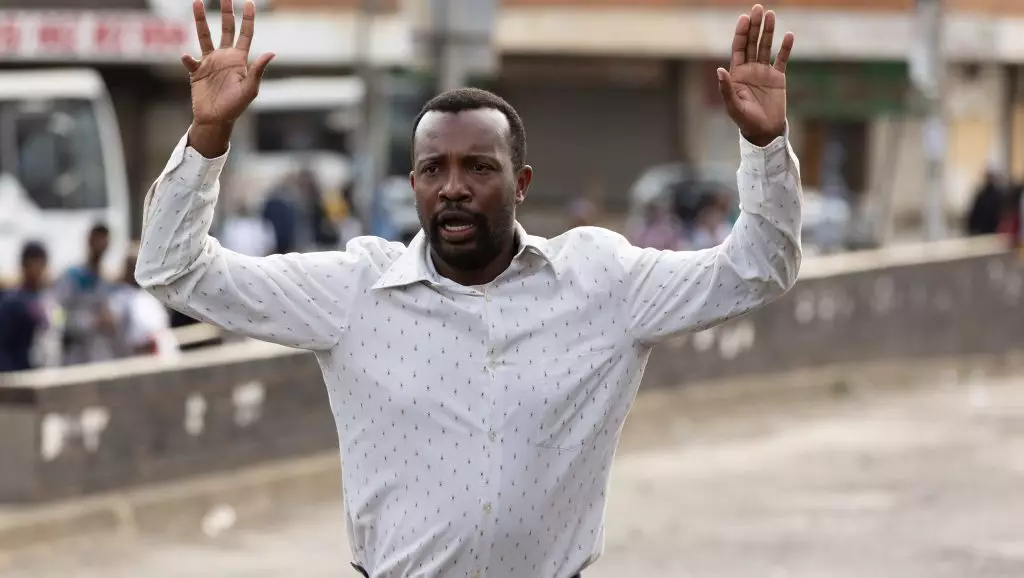In an unsettling entry into the canon of true-crime documentaries, Showmax’s series “The ABC Killer” delves into the harrowing saga of Moses Sithole, a notorious South African serial killer. Sithole’s reign of terror throughout the early 1990s shocked a fledgling nation just beginning to emerge from the shadows of apartheid. Credited with the chilling conviction of 38 murders, 40 rapes, and a series of robberies, his story is not only a testament to the darkest facets of human nature but also a reflection of a society grappling with new freedoms amidst chaos and brutality.
The trailer evokes an atmosphere of palpable dread, where even seasoned professionals like former detective Paul Nkomo expressed sentiments of fear and hopelessness as they surveyed the carnage wrought by Sithole. “I thought the devil has come down to Earth,” Nkomo’s statement underscores the mindset of the time; citizens were caught between the promise of change and the haunting presence of evil that seemed to lurk around every corner.
This three-part series utilizes a unique lens, taking viewers back to a decisive moment in South Africa’s history just months after Nelson Mandela became the country’s first democratically elected president. It intertwines personal narratives with broader societal implications, creating a nuanced tapestry that paints the struggle against this malevolent force. Tamsen de Beer, a rookie journalist who found herself embroiled in Sithole’s twisted reality, represents not just a voice but a raw, emotional connection that is often overlooked in crime documentaries.
A Disturbing Connection
The friendship that developed between journalist de Beer and the killer reveals a psychological complexity that is both unsettling and riveting. De Beer recounts that her relationship with Sithole felt like a “journey” as she grappled with the bizarre sense of obligation to understand him. This relationship speaks volumes about the psychological allure that serial killers exert—transcending mere monstrosity to almost humanize individuals often branded as irredeemable. “I was hoping he was okay all the time, which is absolutely crazy,” she reflects, allowing viewers to glimpse the intricate dance of empathy, horror, and the human mind’s dark corners.
Sithole’s choice of victims—young Black women—illuminates deeper systemic issues of gender and race that still resonate in South Africa today. It’s a stark reminder of the vulnerabilities that remain in marginalized communities, often exacerbated by socio-economic instability. The show is timely, as it sheds light on unresolved issues in the country and the still-emerging narratives around justice and equity.
Crafting the Narrative
Director Jasyn Howes’ previous endeavors in true-crime storytelling have set high expectations. He brings a visceral storytelling style alongside practical reenactments that enhance emotional immersion. Locations tied to Sithole’s story, including The Star newspaper’s offices and the Germiston Train Station, are resurrected for a powerful effect, establishing a sense of realism that invites viewers to inhabit those spaces of horror.
Moreover, the insightful contributions from experts like profiler Micki Pistorius and a host of former detectives offer an academic lens that elevates the documentary beyond mere sensationalism. Pistorius and others not only recount the investigative struggle but also reflect on the broader cultural implications and psychological fallout from hunting such a prolific predator.
The accessibility to recorded phone calls and diary entries adds further depth; these artifacts transform the narrative from a third-party portrayal into a deeply personal saga interwoven with real emotions and haunting recollections. Howes’ dedication to authenticity is commendable, ensuring that audiences are not merely observers but active participants in understanding the chilling intricacies of the crimes.
Reflections on a Grim Legacy
Moses Sithole’s legacy as South Africa’s version of Ted Bundy extends far beyond his horrific acts. As he serves an astonishing sentence of over 2,400 years in prison, the complications and repercussions of his crimes linger in the fabric of South African society. The ABC Killer stands not just as a series chronicling his terror but as a vital exploration of the enduring trauma experienced by countless lives caught in the crosshairs of brutality and injustice.
In a world where the macabre often attracts both fascination and moral repulsion, “The ABC Killer” seeks to illuminate more than just the darkness—it seeks to spark necessary conversations around trauma, empowerment, and the unyielding quest for justice in a world that grapples continuously with its own demons.
